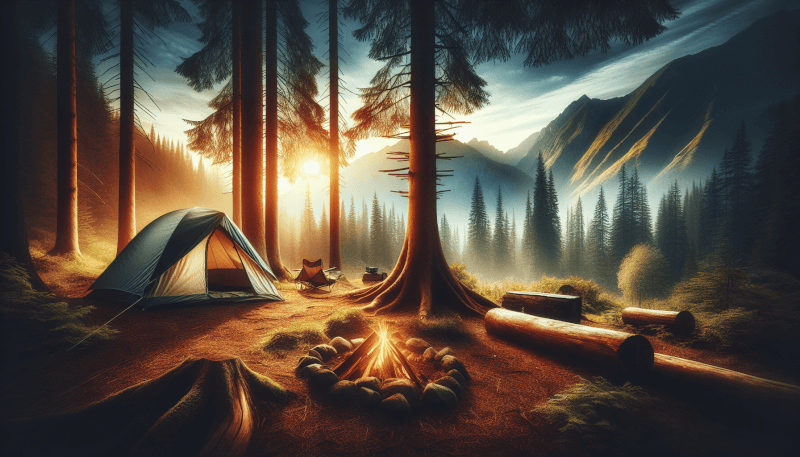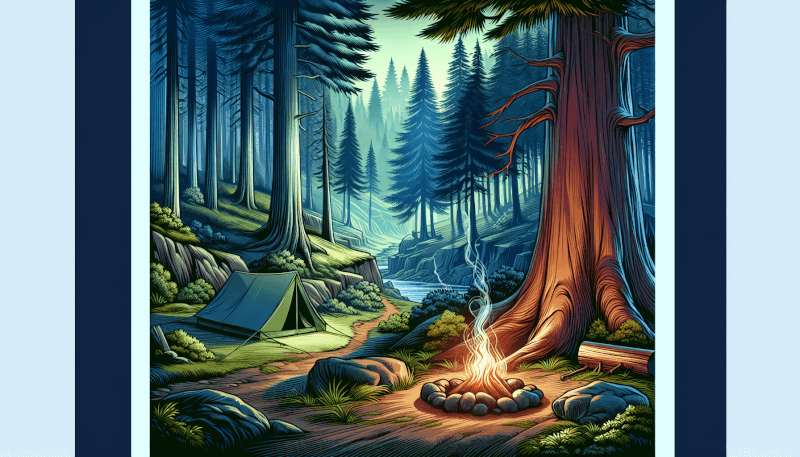Imagine escaping from the bustling city life and finding yourself surrounded by the tranquility of nature. Camping Adventure Stories: Embracing Solitude in Remote Campgrounds takes you on a journey where you can disconnect from the noise and chaos of everyday life and reconnect with yourself and the natural world. Experience the thrill of exploring hidden trails, falling asleep under a canopy of stars, and waking up to the sound of birdsong. Whether you are a seasoned camper or new to the world of outdoor adventures, this article will inspire you to embrace solitude and seek out the beauty of remote campgrounds for unforgettable experiences in nature.
The Beauty of Remote Campgrounds
Remote campgrounds offer a unique and magical experience for outdoor enthusiasts. These hidden gems provide a chance to escape the hustle and bustle of everyday life and immerse yourself in the beauty of nature. The allure of solitude, the opportunity to disconnect from technology, and the chance to have a truly immersive experience in nature are just a few reasons why remote campgrounds are so appealing.
The allure of solitude
One of the most enticing aspects of remote campgrounds is the solitude they offer. Far away from crowded campsites and noisy cities, these secluded spots provide a peaceful retreat where you can truly unwind and recharge. With no distractions, you can fully immerse yourself in the present moment and embrace the tranquility of your surroundings. Whether you’re sitting by a campfire, gazing up at the stars, or exploring nearby trails, the sense of solitude in remote campgrounds can be truly liberating.
Disconnecting from technology
In today’s fast-paced world, we are constantly bombarded with notifications, emails, and social media updates. Remote campgrounds offer a welcome respite from this constant digital noise. When you choose to camp in a remote location, you have the opportunity to disconnect from technology and reconnect with yourself and nature. Leave your phone in your backpack, turn off your laptop, and embrace the simplicity of life without constant screens. Without the distractions of technology, you can fully engage with your surroundings and experience the peace and serenity that only nature can provide.
Immersion in nature
Remote campgrounds provide the perfect opportunity to immerse yourself in the beauty of nature. With no city lights to mask the stars, the night sky becomes a dazzling display of constellations and celestial objects. During the day, you can explore hiking trails that wind through pristine forests, swim in crystal-clear lakes, and observe wildlife in their natural habitat. Whether you’re a seasoned outdoor enthusiast or a first-time camper, the chance to fully experience nature’s wonders is a truly awe-inspiring adventure.
Choosing the Perfect Remote Campground
While the idea of camping in a remote location may sound appealing, choosing the right campground is essential for a successful and enjoyable adventure. Researching remote locations, considering safety and accessibility, and finding hidden gems are important factors to consider when selecting a remote campground.
Researching remote locations
Before embarking on your remote camping adventure, it’s crucial to research potential locations. Look for campgrounds that are off the beaten path, away from popular tourist destinations. Seek out campgrounds that offer the solitude and tranquility you desire. Online forums, camping websites, and books on remote camping can be valuable resources for finding lesser-known campgrounds that fit your criteria. Take the time to read reviews, check for any restrictions or special permits required, and gather information on the facilities and amenities available at each location.
Considerations for safety and accessibility
When choosing a remote campground, safety should be a top priority. Ensure that the campground you select is accessible and well-maintained. Consider the distance from the nearest town or hospital, as well as the availability of emergency services. It’s also important to assess the terrain and weather conditions of the area. Remote campgrounds may have rugged trails or limited cell phone reception, so it’s essential to be prepared for the challenges that may arise. Always check the weather forecast before your trip and pack accordingly.
Finding hidden gems
Discovering hidden gems is one of the joys of remote camping. These lesser-known campgrounds often offer incredible natural beauty and a more intimate camping experience. Reach out to local outdoor enthusiasts, join camping groups or forums, and ask for recommendations. Sometimes, the best remote campgrounds are found through word-of-mouth. Be open to exploring new locations and be willing to venture outside your comfort zone. These hidden gems can provide unforgettable memories and a deeper connection with the natural world.

Preparing for a Remote Camping Adventure
Proper preparation is essential for a successful and enjoyable remote camping adventure. Packing the essential camping gear, stocking up on supplies, and creating a detailed itinerary will ensure that you are well-prepared for your time in the wilderness.
Essential camping gear
When packing for a remote camping trip, it’s important to bring the right gear to ensure your comfort and safety. A sturdy and reliable tent is essential for shelter, along with a warm sleeping bag and sleeping pad for a good night’s sleep. Other essential items include a camping stove or fire starter for cooking meals, a flashlight or headlamp, a first aid kit, water bottles or a water filter, and appropriate clothing for various weather conditions. Depending on the location, additional gear such as hiking poles, bear canisters, or bug repellent may also be necessary.
Stocking up on supplies
Since remote campgrounds are often far away from stores and amenities, it’s important to stock up on supplies before heading out. Make a checklist of essential items such as food, water, toiletries, and camping essentials like matches, firewood, and cooking utensils. Consider the duration of your stay and plan your meals accordingly, packing non-perishable foods that are easy to prepare and provide the necessary sustenance for your outdoor adventures. It’s also a good idea to bring extra supplies in case of emergencies or unexpected delays.
Creating a detailed itinerary
While remote camping offers the freedom to explore and relax at your own pace, having a detailed itinerary can help ensure that you make the most of your time in the wilderness. Research the trails and attractions in the area and plan out your activities accordingly. Consider the length and difficulty of each hike, the time needed for wildlife spotting or photography, and any other attractions or landmarks you’d like to visit. Having a well-planned itinerary will help you maximize your time and make the most of your remote camping adventure.
Solo Camping: Facing Fears and Enjoying Freedom
Solo camping can be an incredibly rewarding experience, offering a chance for self-discovery, personal growth, and a deep connection with nature. However, the idea of camping alone can also be intimidating for some. By embracing the freedom and independence that solo camping offers, overcoming the fear of solitude, and finding peace in your own company, solo camping can become an empowering experience.
Overcoming the fear of solitude
The fear of solitude is a common concern for those considering solo camping. Being alone in the wilderness may bring up feelings of vulnerability or loneliness. However, facing these fears head-on can lead to personal growth and an increased sense of self-confidence. Start by taking small steps, such as short day hikes or overnight trips, to become more comfortable with your own company and the solitude of nature. With each solo camping adventure, you’ll become more confident in your abilities and more at ease with the solitude that remote campgrounds provide.
Finding peace in solitude
Solo camping offers a unique opportunity to find peace and solitude in nature. Without the distractions of everyday life, you can fully immerse yourself in the present moment and connect with the beauty of your surroundings. Embrace the silence, listen to the sounds of nature, and take the time to reflect and recharge. Use this time alone to practice mindfulness, to journal, or simply to enjoy the stillness. Solo camping allows you to focus on yourself and your own needs, helping you find peace and clarity in the solitude.
Taking advantage of independence
One of the great advantages of solo camping is the freedom and independence it offers. With no one else to consider, you can tailor your camping experience to your own preferences. Choose your own hiking trails, set your own pace, and make decisions without compromise. Embrace the freedom to explore, discover, and follow your own instincts. Solo camping allows you to challenge yourself, push your limits, and create unforgettable memories that are uniquely your own.

Camping Safety: Tips for Staying Secure in Remote Areas
While remote camping offers a chance to escape into nature and find solitude, it’s important to prioritize safety to ensure a secure and enjoyable camping experience. Campsite selection and preparation, navigating weather challenges, and handling wildlife encounters are crucial considerations for staying safe in remote areas.
Campsite selection and preparation
When setting up camp in a remote area, it’s important to choose your campsite carefully. Look for a level and well-drained area for pitching your tent, away from dead trees or overhanging branches that could pose a safety risk. Clear away any debris, rocks, or other potential hazards from the campsite. It’s also important to be mindful of your surroundings and to avoid camping near areas with high wildlife activity or potential insect nests. Before leaving your campsite, ensure that the fire is fully extinguished and that all food and garbage is properly stored to reduce the risk of wildlife encounters.
Navigating weather challenges
Remote campgrounds often come with unpredictable weather conditions, so being prepared for various elements is crucial. Check the weather forecast before your trip and pack appropriate clothing, including rain gear and layers for fluctuating temperatures. Plan your activities accordingly, allowing for flexibility in case of inclement weather. Be aware of signs of changing weather, such as darkening skies, increasing winds, or drastic drops in temperature, and adjust your plans accordingly. Always prioritize safety and seek shelter in case of severe weather conditions.
Handling wildlife encounters
Encountering wildlife is a natural part of the remote camping experience, but it’s important to approach these encounters with caution and respect. Research the types of wildlife that are native to the area and familiarize yourself with their behavior, particularly if there are any potential dangers or hazards. Store food securely to minimize the risk of attracting wildlife to your campsite and follow guidelines for food storage provided by local authorities. If you do encounter wildlife, maintain a safe distance, observe quietly from a distance, and never feed or approach wild animals. By respecting wildlife and following safety guidelines, you can minimize the risk of encounters and enjoy the beauty of nature without disrupting the natural balance.
The Joys of Campfire Cooking: Recipes for Remote Camping
No camping experience is complete without the joy of gathering around a crackling campfire and enjoying delicious meals cooked in the great outdoors. Whether you’re a gourmet chef or a beginner camper, campfire cooking offers a unique opportunity to connect with nature and savor the flavors of outdoor cuisine. With simple and delicious meal ideas, cooking techniques for outdoor settings, and tips for packing food for longer stays, you can elevate your remote camping culinary adventures to a whole new level.
Simple and delicious meals
When it comes to campfire cooking, simplicity is key. Focus on meals that are easy to prepare, require minimal ingredients and equipment, and still pack a flavorful punch. One-pot meals, such as chili, stir-fry, or stew, are excellent options that can be cooked over an open fire or on a camping stove. Foil-wrapped meals, like foil packet dinners or grilled vegetables, allow for easy cleanup and can be customized to suit your taste preferences. Don’t forget to bring essentials like salt, pepper, and other seasonings to enhance the flavors of your meals.
Cooking techniques for outdoor settings
Campfire cooking requires a different approach than cooking in a traditional kitchen. Embrace the simplicity and rustic charm of outdoor cooking by exploring different techniques. Grilling over an open fire or using a portable grill allows you to enjoy smoky flavors and charred perfection. Dutch ovens and cast iron skillets are versatile tools that can be used to bake, roast, or simmer meals over an open flame. Embrace the challenge of cooking with limited resources and experiment with different cooking methods to create unforgettable outdoor meals.
Packing food for longer stays
If you’re planning a longer stay at a remote campground, thoughtful planning and smart packing can ensure you have an ample supply of food throughout your trip. Focus on non-perishable items that are lightweight and easy to store, such as canned beans, dried fruits, nuts, and energy bars. Consider bringing cooler bags or a portable fridge for perishable items like meat, dairy, and fresh produce. Vacuum-sealed bags are also useful for preserving the freshness of meals and reducing waste. By packing food strategically and minimizing food waste, you can enjoy delicious meals throughout your remote camping adventure.

Exploring Nature: Hiking and Wildlife Spotting in Remote Campgrounds
Exploring the natural wonders of remote campgrounds is one of the most rewarding parts of a camping adventure. From choosing appropriate trails to observing and respecting wildlife and discovering hidden natural wonders, there are endless opportunities for outdoor exploration and appreciation of nature’s beauty.
Choosing appropriate trails
When exploring remote campgrounds, it’s important to choose hiking trails that are suitable for your fitness level and experience. Research trail maps, read reviews, and consult with park rangers or knowledgeable locals to find trails that match your preferences and skill level. Consider factors such as distance, elevation gain, and terrain difficulty when planning your hikes. Be prepared with the appropriate gear, including sturdy footwear, trekking poles, and a well-stocked backpack with essentials like water, snacks, and a map. Always follow trail markers and stay on designated paths to minimize your impact on the environment.
Observing and respecting wildlife
Remote campgrounds offer a unique opportunity to observe wildlife in their natural habitat. Whether it’s spotting a majestic bald eagle soaring through the sky or catching a glimpse of a deer quietly grazing, encountering wildlife can be a truly awe-inspiring experience. However, it’s important to remember that wildlife should be observed from a safe and respectful distance. Maintain a respectful silence and avoid sudden movements or loud noises that may startle or disturb the animals. Never feed or touch wildlife and avoid approaching nests or dens. By observing and respecting wildlife, you can enjoy their beauty while also ensuring their safety and well-being.
Exploring hidden natural wonders
Remote campgrounds often hide incredible natural wonders that are waiting to be discovered. From hidden waterfalls and secret caves to breathtaking viewpoints and mesmerizing rock formations, these hidden gems offer a chance to connect with nature on a deeper level. Take the time to explore beyond the beaten path and be open to unexpected discoveries. Research local attractions and seek recommendations from fellow campers or park rangers to uncover these hidden natural wonders. The thrill of exploration and the satisfaction of discovering something truly special will make your remote camping adventure even more memorable.
Nighttime Adventures: Stargazing and Campfire Stories
When the sun sets in remote campgrounds, a whole new world comes alive. The night sky becomes a canvas of glittering stars, and the crackling campfire provides the perfect backdrop for sharing captivating stories. Embrace the nighttime adventures of stargazing, identifying constellations and celestial objects, and sharing campfire stories for an unforgettable camping experience.
Identifying constellations and celestial objects
Stargazing in remote campgrounds offers a chance to witness the beauty of the cosmos like never before. Away from the bright lights of cities, the night sky becomes a dazzling spectacle of stars, planets, and celestial objects. Invest in a star chart or download a stargazing app to help identify constellations, planets, and other objects. Learn about the mythology and stories associated with different constellations, and challenge yourself to find as many as possible. Stargazing can be a peaceful and meditative activity that allows you to connect with the vastness of the universe and appreciate the wonders of the night sky.
Embracing the magic of the night sky
The night sky in remote campgrounds holds its own magical allure. As the campfire crackles and casts its warm glow, take a moment to simply sit and gaze up at the stars. Allow yourself to be captivated by the beauty and vastness of the universe. Watch as shooting stars streak across the sky and make wishes in the darkness. Embrace the mystery and wonder that the night sky offers and let it transport you to a place of deep contemplation and awe.
Sharing captivating campfire stories
Campfire stories have long been a beloved tradition in camping adventures. Gather around the campfire, roast marshmallows, and share captivating stories with your fellow campers. Whether they are tales of adventure, ghost stories, or personal anecdotes, campfire stories have a way of bringing people closer together and creating lasting memories. Let your imagination run wild and embrace the opportunity to share your own stories or listen to the tales of others. Campfire stories create a sense of community and camaraderie, and the flickering flames and crackling embers add an enchanting ambiance to the storytelling experience.

Capturing Memories: Photography Tips for Remote Campgrounds
Remote campgrounds provide endless opportunities for capturing breathtaking photographs that encapsulate the beauty and solitude of nature. With the right equipment, composition and lighting techniques, and an understanding of how to preserve the essence of solitude in your photographs, you can create lasting memories of your camping adventure.
Choosing the right equipment
When it comes to photography in remote campgrounds, choosing the right equipment is crucial. Invest in a high-quality camera that suits your skill level and preferences. Consider a DSLR or mirrorless camera for more advanced control over settings, but don’t underestimate the power of a smartphone camera for capturing stunning images. Opt for lenses with a versatile range, such as wide-angle lenses for landscape shots and telephoto lenses for wildlife photography. Tripods are also essential for stability, especially in low-light situations or long-exposure shots. Additionally, carry extra batteries and memory cards to ensure you have enough power and storage for capturing all the beautiful moments.
Composition and lighting techniques
Capturing the beauty of remote campgrounds requires an understanding of composition and lighting techniques. Follow the rule of thirds to create visually pleasing images by dividing the frame into thirds both horizontally and vertically, and placing the focal point or subjects along these lines. Experiment with different perspectives and angles to add depth and interest to your photographs. When it comes to lighting, the golden hour, which occurs around sunrise and sunset, offers the most magical light for capturing stunning landscapes. Embrace the soft, warm light during these times of day for breathtaking photographs. Don’t be afraid to play with shadows and highlights to create depth and evoke a sense of mystery in your images.
Preserving the essence of solitude in photographs
One of the challenges of photographing remote campgrounds is capturing the essence of solitude and the deep connection to nature. To achieve this, focus on incorporating elements that convey a sense of tranquility and peace. Capture wide-angle shots that showcase the vastness and untouched beauty of the landscape. Include silhouettes of lone trees, empty trails, or a solitary camper to evoke a sense of solitude. Pay attention to the details, such as dewdrops on a leaf or the intricate patterns of a spiderweb, to capture the intricacies of nature. By thoughtfully composing your shots and emphasizing the solitude and beauty of remote campgrounds, your photographs will evoke a sense of awe and appreciation for the natural world.
Leaving No Trace: Responsible Camping in Remote Areas
Camping in remote areas comes with the responsibility of leaving no trace and minimizing our impact on the environment. Proper waste management, respecting wildlife and vegetation, and leaving a minimal impact on the environment are essential principles to follow for responsible camping.
Proper waste management
When camping in remote areas, it’s crucial to practice proper waste management to preserve the pristine beauty of the natural surroundings. Pack out what you pack in, leaving no trace of your presence. Bring garbage bags or reusable containers to store your trash and dispose of them properly when you leave. Avoid leaving any food scraps or garbage behind, as it can attract wildlife and disrupt the natural balance. If the remote campground does not have restroom facilities, ensure you properly bury any human waste following Leave No Trace principles. By taking responsibility for your own waste and minimizing its impact, you can help preserve the cleanliness and beauty of remote campgrounds.
Respecting wildlife and vegetation
Respecting wildlife and vegetation is another important aspect of responsible camping in remote areas. Keep a safe distance from wild animals and never feed or approach them. Respect their natural habitat by staying on designated trails and avoiding trampling vegetation or damaging fragile ecosystems. Avoid loud noises, excessive movement, or bright lights that may disturb or stress wildlife. Take the time to learn about the local flora and fauna and understand the importance of preserving their habitats. By respecting and appreciating the wildlife and vegetation in remote campgrounds, you are ensuring that future generations can also enjoy the wonders of these pristine environments.
Leaving a minimal impact on the environment
Minimizing your impact on the environment is a fundamental principle of responsible camping. Set up your campsite on designated areas and avoid disturbing the natural surroundings. Use existing fire rings rather than creating new ones and only burn clean, untreated wood to minimize air pollution. When gathering firewood, stick to fallen branches or use local firewood to prevent the spread of invasive species. Use biodegradable soap for washing dishes and personal hygiene, and avoid using excessive amounts of water. Leave natural objects where you find them, respecting the delicate balance of the ecosystem. By leaving a minimal impact on the environment, you’re ensuring that future campers can enjoy the same pristine wilderness that you experienced.
Remote campgrounds offer a chance to escape, disconnect, and connect with nature in a way that is truly special. By choosing the perfect remote campground, preparing for your adventure, embracing the freedom of solo camping, prioritizing safety, savoring the joys of campfire cooking, exploring nature, embracing nighttime adventures, capturing memories through photography, and practicing responsible camping, you can have an unforgettable camping experience that will leave you feeling rejuvenated and inspired. So pack your bags, leave the noise of everyday life behind, and embark on a remote camping adventure that is bound to leave you with memories to cherish for years to come.



